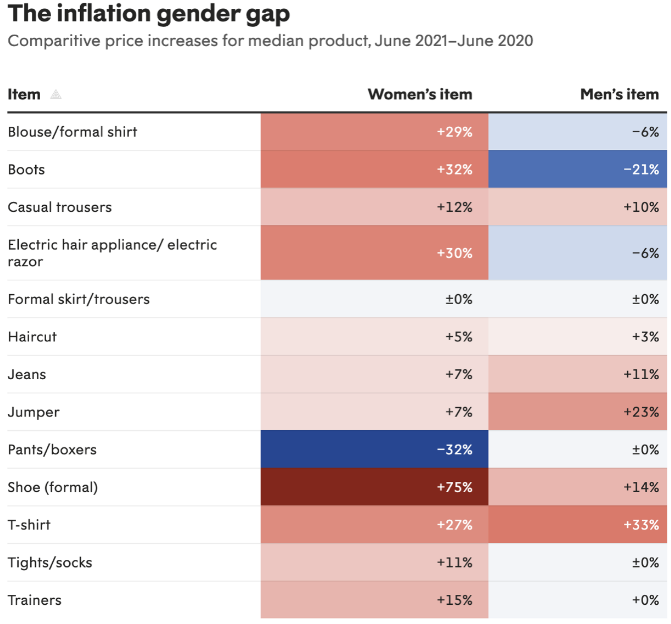by Bincheng Mao*
Across the world, we are facing an acute inflation crisis. In its latest economic outlook report, the IMF forecasts global inflation to increase to a record 8.8 percent in 2022, citing lingering pandemic disruptions and Russia’s invasion of Ukraine. Such high levels of inflation have sent prices of goods and services soaring. And it is therefore urgent to counter this cost-of-living crisis to protect people’s pockets.
This global inflation crisis affects everyone, but women and girls are disproportionately affected. Over the past two years, prices of products aimed at women have risen even faster than those for men. In Britain, for instance, women’s formal shoes have seen a price increase of 75% in 2021, while those for men increased by only 14%. The same inequities are also visible when it comes to electric razors, T-shirts, jeans, and even haircuts in the world’s fifth-largest economy. Before the inflation crisis began, women were already less wealthy than men worldwide.
The crisis also threatens to unravel social progress on closing the gender pay gap for women. Women are less likely than men to receive a salary rise at a rate higher than the rate of inflation in 2022. In the US, a recent national survey found that men are 33.3% more likely than women to have their salary keep pace with inflation. Similarly, in the UK inflation is forecast to exacerbate the existing gender wage gap between women and men. Civil society organizations need to put pressure on governments to provide more support for women. Here are three ways they can do that:

1. Build greater social awareness
The public needs to be well informed about the facts on the ground in order to mobilize adequate resources and support for women. Civil society organizations should launch coordinated campaigns to raise public awareness of the increased inflationary effects on women’s products. An effective campaign would involve coordination between two types of civil society organizations: research institutions and advocacy groups.
Research-focused civil society groups, such as think tanks, can provide data-driven analyses on key issues, advising the public and policymakers on gender equity during this cost-of-living crisis. Advocacy-focused organizations should actively seek out partnerships with credible research institutions to help amplify expert advice on advancing women’s equality and empowerment.
2. Promote a quality childcare system
People with childcare responsibilities are facing an especially severe cost-of-living crisis. Among them, single parents are significantly more likely to fall into poverty during an economic downturn, as shown during the COVID-19 pandemic. In countries across North America, Europe, and Asia, women make up a majority of single parents; in the US, 80 percent of single-parent families are headed by women.
Affordable childcare can lift families out of poverty and contribute to the economy. Childcare is particularly important for single mothers, as it gives them the time and space to train, allowing them to enter the workforce. Civil society experts need to make the case to governments on establishing or reforming the childcare system to balance inflation control with social welfare. Advocacy organizations should summarize and present data on this through simple visual representations. They should raise public awareness of patterns and trends in gender-based economic inequality, and the impact of inflation.
3. Support women in the global south
International not-for-profit organizations should also focus their work with governments in the global south around the impact of the inflation crisis on women. International organizations can help collect data that allow local governments to make informed social and development policy decisions. Once policy decisions are made, non-profit organizations can also facilitate their implementation on the local level to ensure those in need receive adequate assistance.
“In order to be a man, you have to recognize that all women and all those around you are equal,” women’s rights activist Malala Yousafzai said at the 2018 World Economic Forum annual meeting. In the face of a global inflation and cost-of-living crisis, all of us, men and women, should evaluate and act on the disproportionate impact this crisis has had on women.
*Global Shaper, New York Hub
**first published in: Weforum.org




 By: N. Peter Kramer
By: N. Peter Kramer
